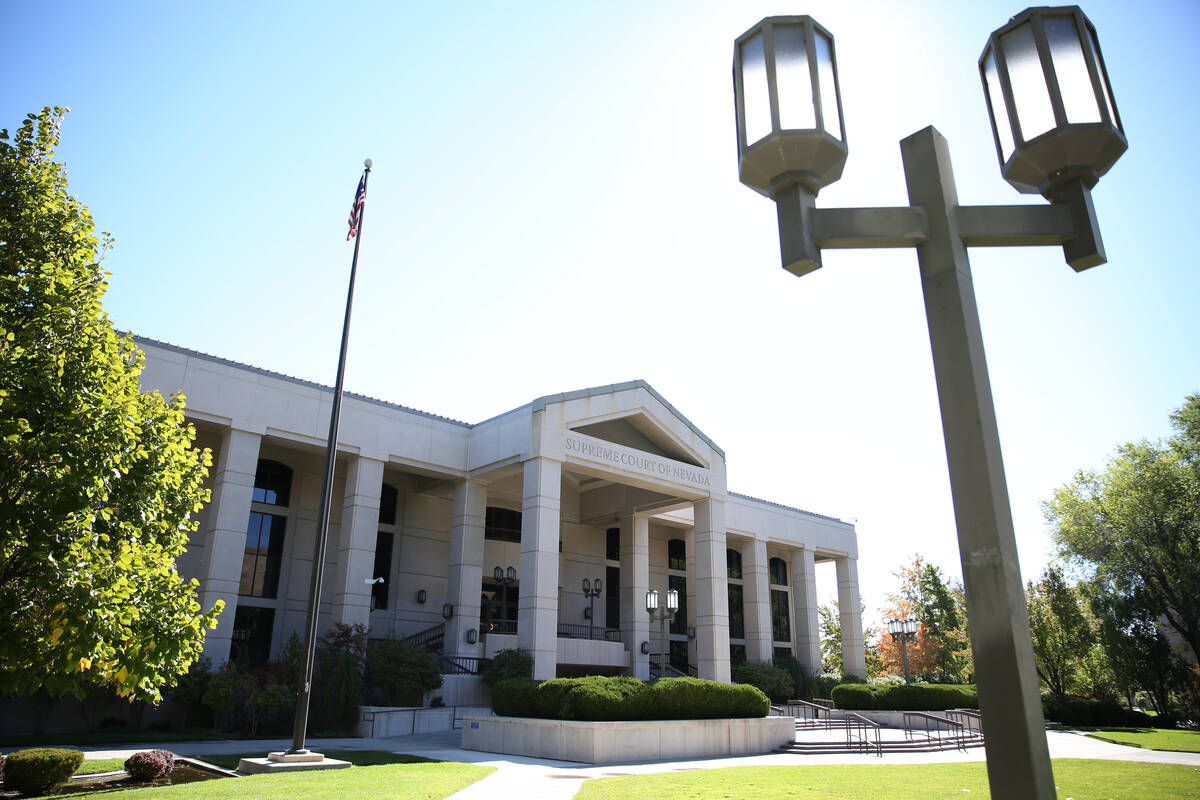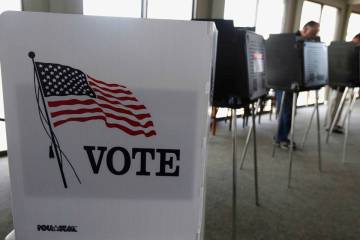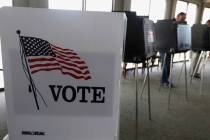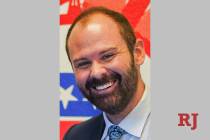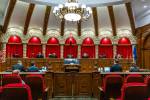Nevada high court upholds open primary, ranked choice initiative
A divided Nevada Supreme Court on Tuesday decided the fates of three ballot initiatives, one of which could radically change how elections are run in the state.
In a 4-3 decision, justices allowed an initiative that would allow for open primary elections and ranked-choice general elections in Nevada to survive constitutional challenges. If it gets the required 140,777 valid signatures, it could go before voters in November. It would need to be approved again in 2024 before it could take effect.
In an open primary, all voters are allowed to vote for all candidates, regardless of their party affiliation, which would allow nonpartisans and minor-party members to participate. Currently, only registered Republicans may vote in Republican primaries, and only Democrats in Democratic contests.
In ranked-choice voting, the top five candidates — regardless of party — would appear on a general election ballot. Voters would rank them in order of preference; if no one candidate got 50 percent of the vote, the candidate with the fewest first-choice votes would be dropped, and votes reallocated until a winner got to 50 percent.
Helton v. Nevada Voters First PAC by Steve Sebelius on Scribd
Critics charged the initiative violated the “single-subject” rule, that the description on the petition was deceptive and that it would require spending without identifying a funding source. But a majority consisting of Justices Douglas Herndon, Ron Parraguirre, Abbi Silver and Kristina Pickering turned away those arguments. The measure embraced a single subject — election reform — and its parts were interrelated, they said.
“To conclude otherwise would only serve to frustrate the people’s initiative powers,” they wrote.
In addition, petition framers only have 200 words to describe what their petition does, and cannot include every detail, the majority wrote, especially since a neutral summary will appear on sample ballots sent to voters.
But Justices Elissa Cadish, James Hardesty and Lidia Stiglich disagreed, saying the open primary portion and the ranked-choice portion were two separate measures that should have been placed in separate initiatives.
“Because the changes are distinct and affect different aspects of the election process, the … initiative goes beyond a single subject,” they wrote. “Thus, the majority’s conclusion that requiring distinct changes be presented in separate initiative petitions would frustrate the people’s access to the initiative process directly contradicts our (court’s) precedent.”
The dissenters also took issue with the description, accusing the majority of easing a previously strict rule: “The majority appears to be relaxing the standard for descriptions of effect because of some preconceived notion that it would be difficult to comply with that standard within the 200-word limit,” they wrote.
Education accounts rejected
The court separately voted 5-2 to reject an initiative that, if approved, would have required the Legislature to create “education freedom accounts” that would have allowed parents to take state dollars and use them for private education instead.
The majority — Hardesty, Parraguirre, Stiglich, Cadish and Silver — ruled that even initiatives that aim to change the constitution must specify a funding source if they require spending state money. (On its face, the constitution’s language only requires initiatives that propose new laws to specify where they will find the money to pay for their provisions.) But the majority resolved a conflict in that language by saying the funding requirement applied to both statutes and amendments: “Initiative proponents cannot be permitted to create a hole in the state’s budget merely because they proposed changes via constitutional amendment rather than statutory amendment,” they wrote.
Education Freedom PAC v. Reid by Steve Sebelius on Scribd
The majority also ruled the petition’s description was misleading, primarily because it didn’t tell voters that either tax increases or budget cuts would be necessary to fund its provisions.
And finally, the majority said the measure is improper because it commands the Legislature to pass laws, rather than proposing those laws itself.
But Herndon and Pickering, in a dissent, disagreed, saying that a constitutional amendment could propose spending without having to specify the source, and that the description was adequate. Plus, the dissenters wrote, nothing precludes adopting a constitutional amendment from compelling the Legislature to act; in fact, several other constitutional provisions do exactly that.
“There is no Nevada precedent precluding such initiatives,” the dissenters wrote. “The preclusion of initiatives that propose similar constitutional amendments that require the Legislature to act only chills the people’s initiative power.”
Petition withdrawals upheld
Finally, on a 4-3 vote, a majority upheld a law that allows people who circulate initiatives to withdraw them — even after they’ve qualified with the required number of valid signatures. The case arose after the Clark County Education Association qualified two measures in 2020, one to raise the sales tax and another to raise the gaming tax, but withdrew both after the 2021 Legislature approved a mining tax for education instead.
As part of a deal cut in Carson City, the union requested the petitions be withdrawn, but Secretary of State Barbara Cegavske refused, saying the constitution did not allow for it. Petition authors sued, and Justices Stiglich, Parraguirre, Cadish and Herndon ruled that the withdrawal statute “… is a permissible exercise of the Legislature’s power to enact statutes to facilitate the people’s initiative power and is thus not unconstitutional.”
Cegavske v. Hollowood by Steve Sebelius on Scribd
The ruling turns on the fact that the constitution is silent about withdrawing petitions. For the majority, that meant there was no prohibition to allowing it. But a minority — Justices Hardesty, Silver and Pickering — concluded just the opposite, that the lack of authorization meant withdraws were prohibited. The constitution spells out the precise steps to propose and qualify an initiative, ending with the measure going before voters for their consideration, they wrote.
“Post-transmittal withdrawal that prevents voters from considering the proposal at the next election is not one of the options that the constitution provides,” the dissent reads. “This obstruction shows that the court should have held (the withdrawal statute) unconstitutional, as applied to allow withdraw after a proposal has qualified for and been transmitted to the Legislature.”
Under the ruling, Cegavske cannot put either tax plan on the November ballot.
Contact Steve Sebelius at SSebelius@reviewjournal.com or 702-383-0253. Follow @SteveSebelius on Twitter.



